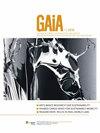The role of transdisciplinarity in building a decolonial bridge between science, policy, and practice
IF 1.9
4区 社会学
Q4 ENVIRONMENTAL SCIENCES
引用次数: 3
Abstract
Research that focuses on changing problems of poverty, inequality, and food security may not always listen to what people who live in areas with sustainability problems need in order to make those changes. In our analysis of development research projects, we reflect on the challenges of participation faced by different actors in transdisciplinary science. For a decolonial turn, people need to be involved in making decisions about resources, research topics, and how to use knowledge.Transdisciplinary research is considered to offer contributions of science to sustainability transformations, partly because transdisciplinary approaches aim to increase the relevance, credibility, and legitimacy of scientific research by ensuring the active participation of non-academic actors in research. However, the possible impact of transdisciplinary research on decolonial sustainability science ‐ understood as actively undoing Euro-North American centricity, dispossession, racism, and ongoing power imbalances in inequitable social-ecological systems ‐ and simultaneous response to scientific rigor remain under debate. Thus, this article assesses the contributions of transdisciplinary research projects to decolonial sustainability science based on empirical information. To do so, we analyze a sample of 43 development research projects of the Swiss Programme for Research on Global Issues for Development (r4d programme) in Africa, Asia, and Latin America. We found that despite significant differences in approaches, Global-North-dominated sustainability science still has far to go to achieve the decolonial potential of transdisciplinarity, enabling different actors’ participation.跨学科在建立科学、政策和实践之间的非殖民化桥梁中的作用
专注于不断变化的贫困、不平等和粮食安全问题的研究可能并不总是听取生活在有可持续性问题地区的人们需要什么才能做出这些改变。在我们对发展研究项目的分析中,我们反思了跨学科科学中不同参与者在参与方面面临的挑战。对于非殖民化的转变,人们需要参与关于资源、研究主题和如何使用知识的决策。跨学科研究被认为是科学对可持续性转变的贡献,部分原因是跨学科方法旨在通过确保非学术行为者积极参与研究来提高科学研究的相关性、可信度和合法性。然而,跨学科研究对非殖民化可持续性科学的可能影响——被理解为积极消除欧洲-北美的中心性、剥夺、种族主义和不公平的社会生态系统中持续存在的权力失衡——以及对科学严谨性的同时回应——仍在争论中。因此,本文基于实证信息评估了跨学科研究项目对非殖民化可持续性科学的贡献。为此,我们分析了瑞士全球发展问题研究计划(r4d计划)在非洲、亚洲和拉丁美洲的43个发展研究项目的样本。我们发现,尽管在方法上存在重大差异,但全球北方主导的可持续发展科学要实现跨学科的非殖民化潜力,让不同的参与者参与进来,还有很长的路要走。
本文章由计算机程序翻译,如有差异,请以英文原文为准。
求助全文
约1分钟内获得全文
求助全文
来源期刊

Gaia-Ecological Perspectives for Science and Society
ENVIRONMENTAL SCIENCES-
CiteScore
2.30
自引率
18.80%
发文量
43
审稿时长
>12 weeks
期刊介绍:
GAIA is a peer-reviewed inter- and transdisciplinary journal for scientists and other interested parties concerned with the causes and analyses of environmental and sustainability problems and their solutions.
Environmental problems cannot be solved by one academic discipline. The complex natures of these problems require cooperation across disciplinary boundaries. Since 1991, GAIA has offered a well-balanced and practice-oriented forum for transdisciplinary research. GAIA offers first-hand information on state of the art environmental research and on current solutions to environmental problems. Well-known editors, advisors, and authors work to ensure the high quality of the contributions found in GAIA and a unique transdisciplinary dialogue – in a comprehensible style.
 求助内容:
求助内容: 应助结果提醒方式:
应助结果提醒方式:


